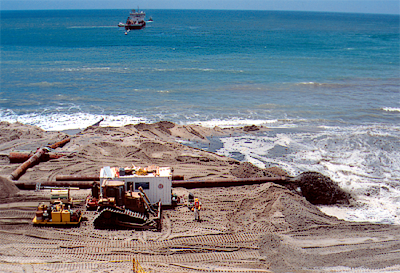
02.06.14
Congress Looks to Reduce Environmental Review of Beach and Water Projects
By Surfrider Foundation  A committee of Senate and House members is negotiating the final version of the Water Resources Development Act (“WRDA”) which authorizes coastal restoration and engineering projects by the Army Corps of Engineers. While the bill S. 601/ HR 3080 contains many important restoration projects, it also includes provisions to reduce environmental and public review of coastal projects. The bill also could allow for indefinite extension of beach fill projects and transfer costs of river and harbor dredging from private companies onto taxpayers. Finally, the House version of the bill includes a bad amendment to obsruct implementation of the National Ocean Policy.
A committee of Senate and House members is negotiating the final version of the Water Resources Development Act (“WRDA”) which authorizes coastal restoration and engineering projects by the Army Corps of Engineers. While the bill S. 601/ HR 3080 contains many important restoration projects, it also includes provisions to reduce environmental and public review of coastal projects. The bill also could allow for indefinite extension of beach fill projects and transfer costs of river and harbor dredging from private companies onto taxpayers. Finally, the House version of the bill includes a bad amendment to obsruct implementation of the National Ocean Policy.
Surfrider chapters across the country are working to improve the final version of the bill. The conference committee includes a number of members who represent coastal districts. Please visit our Action Alert to find out if your Reprentative is a member of the committee and can improve the legislation!
What is WRDA?
The Water Resources Development Act is federal legislation that provides the main vehicle for authorizing projects—for navigation, flood control, hydropower, recreation, water supply, and emergency management—to be studied, planned and developed by the United States Army Corps of Engineers. The law does not appropriate funds for those projects and programs, however. It authorizes the projects, but the appropriation of funds must be addressed in subsequent legislation. It is a very important piece of legislation that can have a dramatic impact on your favorite beach or surf spot because WRDA funds the U.S. Army Corps of Engineers. Almost every coastal community in America is somehow affected by a Corps of Engineers project. The Corps of Engineers are responsible for many coastal armoring and beach fill projects, channel dredging for navigation, construction of dams and flood control projects, and wetlands alterations to name a few. You can learn more about WRDA's history on Beachapedia.
Harmful Environmental Streamlining
In an effort to speed up approval and construction of projects this WRDA has 'environmental streamlining' provisions (sections 2033 and 2032) that strike at the heart of the laws that provide for meaningful agency and public engagement in Corps projects. The streamlining provisions let the Corps set their own timelines for federal agencies to provide reviews of impacts to natural resources, and can fine those agencies if they miss deadlines. This will make it difficult for those resource experts to raise legitimate issues about Corps projects. The streamlining also could put the Corps in charge of endangered species reviews, instead of the US Fish and Wildlife Service, in an effort to expedite project delivery. The Senate committee approved bill language that strikes at the core of NEPA by sharply tilting the scales toward approval of projects, regardless of potential environmental damage. It sets unreasonably short deadlines for completing reviews, which will inevitably bias agency officials toward rubber-stamping projects to avoid the bill's harsh new fines.
Indefinite Extensions of Beach Projects
The Corps of Engineers frequently commits to maintaining beach fill projects for 50 years. Essentially they come back every few years to dump more sand to create an artificially wide beach, burying nearshore habitat and the sandbars we surf on over and over. There are areas on the East Coast, primarily in New Jersey, where a few of these projects are nearing the end of their 50-year agreement. This bill creates a process to allow the Corps to continue pumping sand for at least 15 years, and possibly indefinitely, without proper review and reduction of the impacts they have seen over the years. So rather than looking back at the 50 year history of these projects and taking time to adjust to changed conditions or learn from their experience, the Corps is being told to just keep doing what they're doing.
Attacks on the National Ocean Policy
The House version of the bill contains an amementment from Rep. Bill Flores (TX) to obstruct implementation of the National Ocean Policy (NOP). Specifically, the rider would block the U.S. Army Corps of Engineers from participating in any NOP efforts including regional ocean planning. To learn more about Rep. Flores' attacks on the National Ocean Policy click here.
Taxpayer Give-Aways for Dredging
This is also a very industry-favorable bill. The bill saddles the federal government with having to pay for more harbor dredging activities (like disposing of toxic dredged materials), and pay for more of the costs to deepen ports, that are now the responsibility of the port industry and private interests. This change will likely lead to a massive amount of permanent, unnecessary and ongoing dredging that could result in large-scale damage to the nation's most important estuaries, while exploding taxpayer costs. It is also unclear what would happen to all of this dredged sediment, and some of it may end up choking our beaches and nearshore.